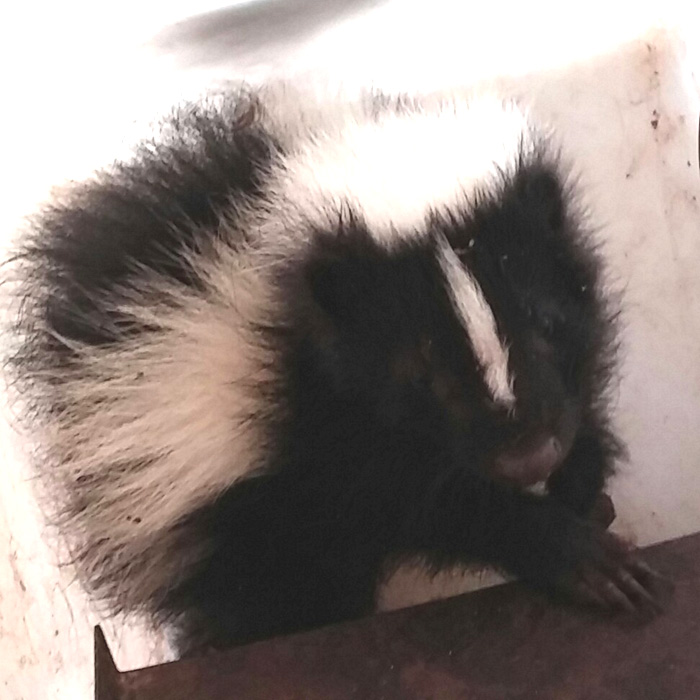- USA Wildlife Removal Education Guide and Resources
Skunk Diseases Transmitted to Humans or Dogs

Skunk Diseases - Like many other mammals, skunks are animals that can be prone to disease, and in many situations these conditions can be passed between skunks, or transmitted to people or other animals. Because skunks are a natural pest, it is important to treat them with respect and not allow yourself to get too close, even if you are trying to help, as it is easy to catch a harmful disease from the animals. However, if skunks are causing a problem for you, by taking the right precautions it is possible to deal with them safely without putting yourself or your family and pets at risk.
Skunks can transmit diseases in several different ways, which is why it is important to be cautious if you are trying to deal with a pest animal problem. If encountered, most skunks will flee rather than face a confrontation with people, but if they do feel there is no other option but to attack, then their bites and scratches can cause diseases to be transmitted. There is also the possibility of zoonotic diseases being passed on through urine contamination or by coming into contact with skunk feces. One of the most interesting aspects of a skunk's physiology is that while the scent they can squirt at a potential threat may be the foulest smelling substance they produce, the scent is not believed to transmit any diseases.
Rabies In Skunks
There are many situations in which a skunk will choose to attack a person or animal, and in the majority of cases where the skunk is captured and tested, they are found to be transmitters of rabies. This is not to say that all skunks you will see will carry rabies, but if you do get bitten it is very important to be tested and start treatment as soon as possible. Looking at the small number of cases that are found in the United States, skunks are among the most at risk from the condition.
Diseases People Can Catch From Skunks
There are several conditions that humans can catch from skunks apart from rabies, with Tularemia being one that can have symptoms such as fever, little appetite and sepsis, which usually appears around three or five days after a bite, scratch or contact with skunk feces and urine. Leptospirosis is a condition that is usually contracted from the feces of animals that carry the disease, and includes symptoms such as severe headaches and muscle pains along with fever, with severe cases leading to kidney failure, liver damage and meningitis.
Conditions Passed From Skunks To Domestic Pets
One of the biggest problems that people will need to be aware of when dealing with skunks is the potential to transmit canine distemper to domestic animals. This causes symptoms including vomiting and diarrhea as well as fever and inflammation of the eyes in the animals it effects, and is usually transmitted when animals come into contact with the feces or urine of the infected skunk. Parasites are also commonly found in skunks, and roundworm and ringworm can both be transmitted to domestic animals.
Diseases Specific To Skunks
Most diseases that can affect skunks can also be transmitted to other animals, but one such condition is Aleutian disease, which is caused by a virus that affects many different systems in the body, ultimately leading to organ failure in the animal.
The Dangers Of Dealing With Skunk Feces
Because there are dangerous conditions such as leptospirosis that can be transmitted through skunk feces, you should always take the appropriate precautions before entering a confined area where skunks have been, or disturbing a skunk's nest. Because the animals do create a significant amount of droppings, and some diseases can become airborne, it is important to wear a pair of goggles and breathing apparatus, to filter out any harmful spores. It is also important to dispose of the feces appropriately, as even if it is buried dogs and other animals can dig it up. Ensure that the feces is placed in a sealed container or garbage bag, and that it is either put out with the garbage or incinerated.
Preventing The Transmission Of Diseases From Skunks
When it comes to dealing with a skunk problem, one of the most important things you can do is to vaccinate your dogs against canine distemper, as it is a horrible condition that can really bring misery to an animal's life. You should also look at methods that can be used to get rid of the skunks, as the longer they are allowed in and around your yard or garden, the more likely they are to cause problems for you, your family and your pets. There are many ways that you can use to trap and remove skunks yourself, but it is also possible to hire a professional to deal with the problem for you.
Go back to the main Skunk Removal page for more information about skunk disease, and which ones humans can get, or pets such as cats or dogs.

